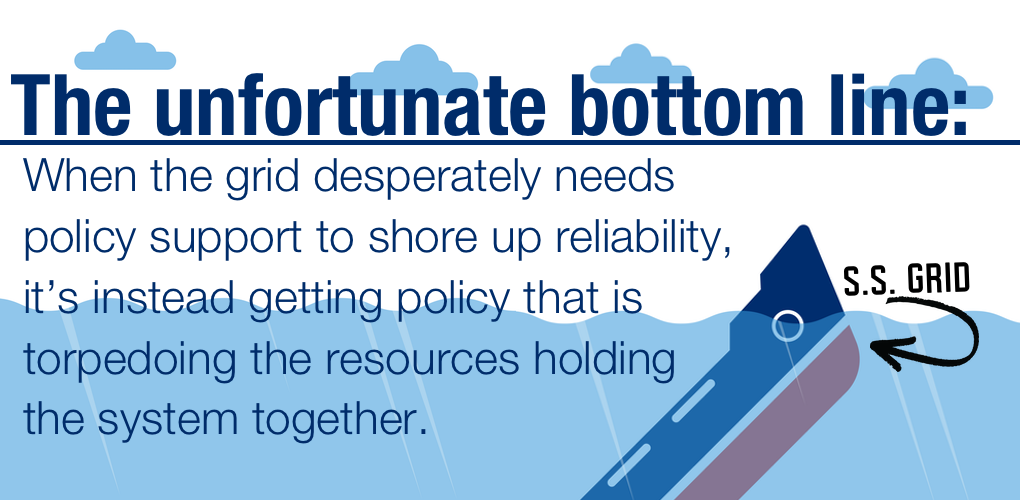
The Energy Policy Torpedo
The nation’s grid reliability watchdog added an alarming new dimension to its regular warnings over the eroding state of the nation’s grid reliability. For the first time, the North American Electric Reliability Corporation (NERC) is warning that energy policy now directly threatens reliability.
In the latest edition of NERC’s Reliability Risk Priorities Report, the authors pointed directly to policy, and the pace of change it’s driving, as one of five key threats to the ongoing reliability of the nation’s electricity supply.
While the report is careful not to highlight specific policies or call for abrupt policy changes, it does underscore the need for better “coordination” between policymakers and those charged with reliability. “There is an undeniable need to increase coordination and collaboration among all policy makers and regulators as well as on the owners and operators” of the bulk power system, it says.
For those paying attention over the past few years, it’s not difficult to read between the lines here. NERC – along with other reliability regulators at the Federal Energy Regulatory Commission (FERC), as well as the grid operators – has expressed increasing frustration with how its warnings about eroding reliability have been ignored and even flatly dismissed by some policymakers. In fact, NERC, FERC and the grid operators have all expressed some level of astonishment at how little engagement they’ve had with the U.S. Environmental Protection Agency (EPA) as the EPA has pushed forward a blitz of rulemakings that will upend the nation’s electricity mix.
With diplomat tact, the report recommends NERC ramp up outreach to policymakers and regulators (here’s looking at you EPA) to “increase awareness of the reliability implications of their policy decisions.”
Should there be any confusion, that’s just an extraordinarily generous way of saying EPA, the Biden administration and its allies in congress simply haven’t been interested in understanding the threat they pose to the grid.
It’s hard to imagine NERC being any louder or clearer about the escalating danger posed by a mismanaged energy transition. One report after another has rung an ever-louder alarm. The fault here lies not with NERC but rather with the Biden EPA and the unseriousness with which the administration and its allies continue to take NERC and FERC’s warnings.
Just a few weeks back, FERC commissioner James Danly took the EPA to task for failing to consult the commission on the reliability impacts of its so-called Clean Power Plan 2.0. And in congressional testimony earlier this summer, FERC, NERC and the grid operators couldn’t have been more direct about the challenges facing the nation’s supply of power.
Jim Robb, the president and CEO of NERC, testified that, “the pace of change is overtaking the reliability needs of the system.” He added, “We must manage the pace of the transformation in an orderly way, which is currently not happening.”
Manu Asthana, President & CEO of PJM Interconnection, the operator of the nation’s largest grid serving 65 million Americans, testified that, “we will need to slow down the retirement or restriction of existing generation until replacement capacity is deployed… Markets have worked for 20 years… What’s different is the massive policy pressure.”
That is the unfortunate bottom line: When the grid desperately needs policy support to shore up reliability, it’s instead getting policy that is torpedoing the resources holding the system together.
- On August 30, 2023
